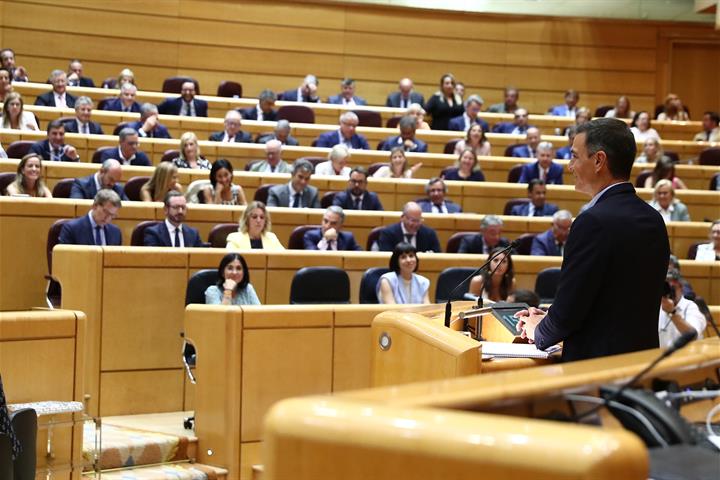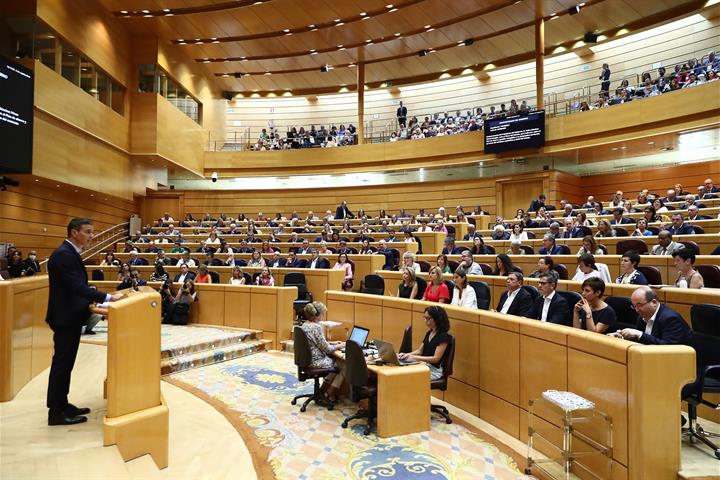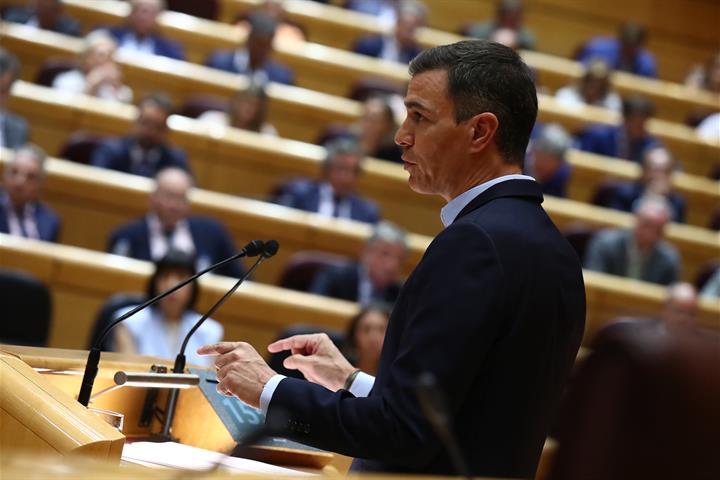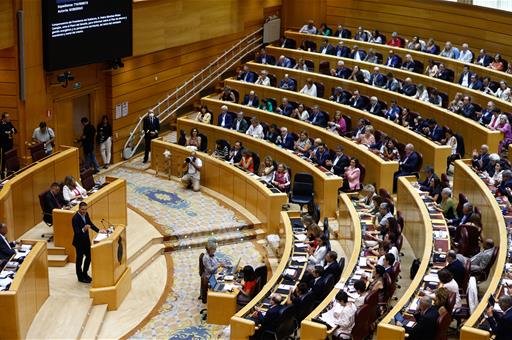Sánchez says Spain will overcome current challenges and uncertainties and continue to grow in the coming years
President's News - 2022.9.6
Upper House of Parliament, Madrid
Pedro Sánchez's initial address to the plenary session of the legislative chamber focused on three issues: What will happen to energy this winter? What will happen to prices? What will happen to the economy and to employment as a whole?
Sánchez has assured that the Government's path in the face of these questions is clear: "We choose hope and we are on the side of solutions".
The president stated that the measures already adopted by the Executive - and those that will be taken from now on - are aimed at protecting families, the middle and working classes, companies, SMEs and the self-employed, and at ensuring that there is a fair and supportive distribution of burdens.
Measures against the energy crisis
 The President of the Government of Spain, Pedro Sánchez, during his appearance in the plenary session of the Upper House of Parliament | Pool Moncloa/Fernando Calvo
The President of the Government of Spain, Pedro Sánchez, during his appearance in the plenary session of the Upper House of Parliament | Pool Moncloa/Fernando Calvo
Sánchez explained that the European Union is preparing for the worst possible energy scenario resulting from the war in Ukraine, which would be a total cut-off of gas supplies by Russia. It is doing so by increasing imports from other countries, accelerating diversification of energy sources and reducing consumption.
Likewise, unity and solidarity among all member states will be fundamental, Sánchez stated. Spain is already helping other countries by exporting gas in the form of electricity and studying the extension of interconnections between the peninsula and the rest of the continent. So far in 2022, he detailed, 10% of the natural gas arriving in the European Union entered through our country (7% in the form of liquefied natural gas and 3% via pipeline).
Furthermore, although Spain is in a better position because it is less dependent on Russian gas and has a third of the EU's total regasification capacity, it has also set a target for reducing gas consumption, specifically by 7%.
The measures adopted in August for public spaces and buildings have already reduced energy consumption by more than 4.6% and additional measures will be formulated shortly. There will also be recommendations for citizens which, Sánchez has guaranteed, will not be dramatic: "It is not about making big sacrifices, but about adopting small changes in habits".
Bending the inflation curve
 The President of the Government of Spain, Pedro Sánchez, during his appearance in the plenary session of the Upper House of Parliament | Pool Moncloa/Fernando Calvo
The President of the Government of Spain, Pedro Sánchez, during his appearance in the plenary session of the Upper House of Parliament | Pool Moncloa/Fernando Calvo
With regard to prices, and although the main economic organisations - the European Commission, the IMF and the Bank of Spain - estimate that inflation will decrease in the coming months, Pedro Sánchez has opted for prudence because there are many unpredictable elements.
However, he said, "Spaniards can be sure of one thing: we will do everything in our power and more to bend the inflation curve and to protect the middle and working classes of our country. We will put the interest of the people before everything else".
The president pointed out that the Government has already mobilised 30 billion euros to mitigate the rise in prices and has approved "unprecedented" measures. Among them, he went over the Minimum Basic Income, pension reform, fuel subsidies, free public transport passes, the electricity social voucher and the reduction in electricity taxes, which will now also be applied to VAT on gas, he said.
The implementation of the Iberian exception has allowed electricity bills of Spanish households and companies to fall by more than 15%. Sánchez announced that the cogeneration facilities of gas-intensive industries will also be temporarily covered by this mechanism, as they had requested.
Sánchez has focused on this measure as an example of the energy market reform proposals put forward by his Government in the European Union: "It was the first who, as early as September 2021, warned that the rules governing the functioning of the electricity market were not working".
The president expressed his satisfaction that the European Commission recently recognised the need for this reform, which is also endorsed by practically all Member States.
Positive economic developments
 The President of the Government of Spain, Pedro Sánchez, during his appearance in the plenary session of the Upper House of Parliament | Pool Moncloa/Fernando Calvo
The President of the Government of Spain, Pedro Sánchez, during his appearance in the plenary session of the Upper House of Parliament | Pool Moncloa/Fernando Calvo
The head of the Executive has relied on data from the European Commission, the OECD, the IMF, the Bank of Spain and the CEOE to put forward a growth forecast for the Spanish economy of 4% in 2022 and more than 2% in 2023.
Sánchez repeated that there are also key uncertainties and challenges in this area, but that Spain faces them in a much better position than in the past and "with great strengths that, according to the majority of national and international organisations, will allow Spain to overcome these challenges and continue to grow in the coming years".
Some of these pillars are the increase in employment and Social Security affiliation, the improvement in industrial production and exports, the recovery of tourism activity, the reduction in household and corporate debt, the consolidation of public accounts and the impact of the implementation of the European NextGenerationEU recovery funds through the Recovery, Transformation and Resilience Plan.
Towards a new economic model
The President of the Government of Spain expressed optimism about the future of Spain and Europe, and expressed his confidence that the structural reforms being carried out will give rise to a new economic model that is "more responsible, more respectful of the environment and more concerned with the well-being of people and social and territorial cohesion".
Sánchez has interpreted the statement 'the era of abundance is over' as an invitation to the end of wastefulness and not as a prognosis of the end of progress because Europe and Spain are not ceasing to progress, they are just "beginning to do so in a different way".
Non official translation





